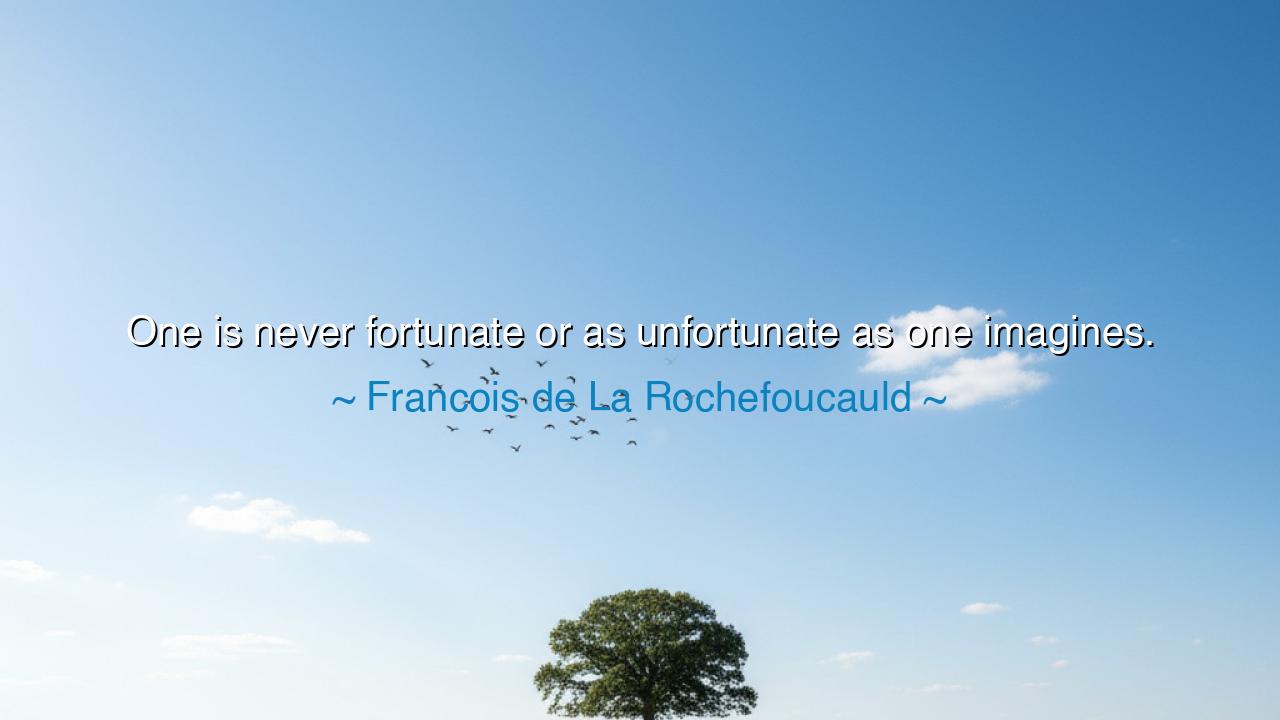
One is never fortunate or as unfortunate as one imagines.






"One is never fortunate or as unfortunate as one imagines." Thus spoke François de La Rochefoucauld, the keen observer of the human heart, whose words cut through illusion like a blade through silk. In this reflection, he reminds us that life is seldom as extreme as our minds would make it. Whether in joy or sorrow, in victory or despair, our imagination—not reality itself—magnifies what we feel. The human heart, ever restless, paints its fortunes brighter than they are and its misfortunes darker than they deserve. Thus, La Rochefoucauld teaches a profound truth: that perception is the true architect of experience, and wisdom lies in tempering both elation and grief with clarity.
The origin of this thought arises from the age in which La Rochefoucauld lived—the 17th century, a time of courtly intrigue and shifting fortunes. In the glittering halls of Louis XIV, men rose and fell like waves upon the sea of favor. One day, a noble might dine with kings; the next, he might be cast into exile or disgrace. From such a life of uncertainty, La Rochefoucauld learned that both triumph and disaster are deceptive. He saw that the imagination of man, inflamed by pride or fear, often distorts reality, making joy more intoxicating and suffering more unbearable than they truly are. His words are not cynicism—they are balance, a reminder that the mind must stand firm amid the illusions of fate.
This truth has echoed through every age. Consider the story of Napoleon Bonaparte, whose imagination once made him believe he was invincible. When he conquered Europe, he thought himself chosen by destiny; when defeat came at Waterloo, he believed himself cursed by the gods. Yet in truth, he was neither saint nor devil, but a man—a man lifted and lowered by the same human currents that move us all. His imagination made his victories seem divine and his failures catastrophic, but history, with its calm eye, sees both as shades within a single human story. Thus, La Rochefoucauld’s wisdom stands: no man’s fortune or misfortune is as grand as it appears in his own mind.
This insight is not meant to dampen passion, but to liberate the spirit from tyranny of emotion. When fortune smiles, we often lose ourselves in ecstasy, imagining that joy will last forever; when misfortune strikes, we sink into despair, convinced the night will never end. Yet both states are illusions. Fortune is fickle, and sorrow passes like a storm. The wise man knows that contentment lies not in circumstance, but in perspective. He neither clings to triumph nor trembles at loss, for he understands that what matters most is not what happens to him, but how he meets it in his soul.
La Rochefoucauld’s saying also carries a subtle compassion. For if our imagination exaggerates our suffering, then perhaps our pain is lighter than we think. Often, what we dread proves less terrible when it arrives, and what we desire turns out less perfect than our dreams. How many have feared poverty only to find peace in simplicity? How many have chased riches only to discover emptiness? The imagination, like a mirror warped by emotion, cannot be trusted to show truth. To live wisely is to see beyond the illusions of fear and longing, to anchor oneself in the calm center of reality.
Think of Helen Keller, who lost sight and sound, yet found meaning greater than many who see and hear. The world might have called her unfortunate, yet she herself said that life was beautiful. Her imagination, rather than darkening her world, illuminated it. She turned suffering into wisdom, limitation into creation. In her, we see the triumph of perspective: that no condition of life is as despairing—or as blissful—as it seems. It is the mind’s interpretation that defines the measure of our fortune.
And so, my children of thought and trial, take this teaching to heart: do not let imagination rule your peace. When fortune blesses you, be grateful but humble, for joy is a visitor, not a king. When hardship comes, be steadfast and patient, for pain is not as eternal as it pretends. Measure your life not by the rise and fall of events, but by the steadiness of your inner spirit. The wise walk through both gardens and storms with equal grace, knowing that neither paradise nor despair is as real as it seems.
For this is the enduring lesson of La Rochefoucauld: that the world is neither as kind nor as cruel as the heart imagines. True wisdom is not to escape emotion, but to see through its illusions—to stand amid the drama of life, calm and clear as a mountain above the clouds. When you remember this, no triumph will intoxicate you, no sorrow will break you. You will live as the ancients taught: not in the fantasies of imagination, but in the quiet, enduring truth of reality itself.






AAdministratorAdministrator
Welcome, honored guests. Please leave a comment, we will respond soon